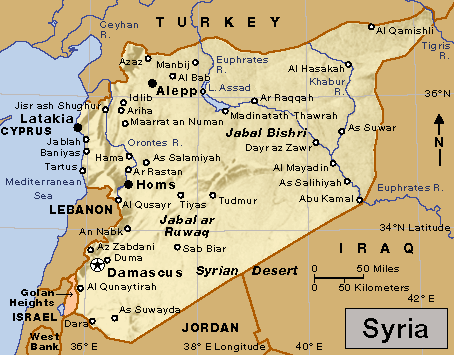Russia, Israel, and European Union at Odds Over Syria
May 28, 2013
The Russian government announced today that it is going ahead with deliveries of S-300 anti-aircraft missiles to Syria. Deputy Foreign Minister Sergei Ryabkov declared that the missiles are a “stabilizing factor” that will discourage “hotheads” from entering the Syrian civil war. At a press conference in Moscow, Ryabkov suggested that the European Union’s (EU) decision to lift its arms embargo on Syria has endangered the prospects for a peace conference next month. The conference is backed by both Russia and the United States. Lifting the embargo could allow weapons to flow to Syrian rebel forces.
Israel responded to Russia’s announcement by declaring that it is prepared to launch missile strikes against any shipments of advanced Russian weapons to Syria. Israeli officials fear that the Russian weapons could upset the current balance in the Middle East, which involves the Lebanon-based radical Islamist organization Hezbollah. Hezbollah, which backs Syrian President Bashar al-Assad, fired thousands of missiles into northern Israel in 2006. Hezbollah relies on Syria to provide a conduit for arms from Iran. Preserving that flow is a matter of life or death for Hezbollah. Stemming the flow is of primary importance to Israel.

Syria has been an important Middle Eastern ally of Russia, Iran, and the Hezbollah organization in Lebanon. (World Book map; map data © MapQuest.com, Inc.)
British Foreign Secretary William Hague announced yesterday that the arms embargo on the Syrian opposition would be lifted after June 1. All EU sanctions against the Assad regime will remain in place. Hague stated that lifting the embargo “sends a very strong message from Europe to the Assad regime.” France and the United Kingdom have pushed to allow European governments to deliver arms to the rebels.
The rebellion against the Assad regime began in March 2011 and has resulted in the deaths of tens of thousands of people and the destruction of World Heritage sites in the ancient city of Aleppo. The BBC reported today that Assad’s forces massacred more than 200 civilians earlier this month after entering the towns of al-Bayda and Baniyas in western Syria.
Russia has long been an ally of Syria and the ruling Assad family. According to international affairs experts, Russian officials fear that if President Assad is pushed out, radical Islamists could take his place. They regard a radical Islamist regime in Syria as a threat to the internal security of Russia, which spent years putting down an Islamist rebellion in Chechnya. In addition, the Russian navy’s sole foothold in the Mediterranean Sea is the Syrian port of Tartus. Russia has leased the Tartus facility as part of a multibillion-dollar debt write-off brokered in 1971.
Additional World Book articles:
- Syria: The Roots of Rebellion (a special report)
- The Middle East: From Fall to Spring (a special report)
- Syria 2011 (a Back in Time article)
- Syria 2012 (a Back in Time article)


